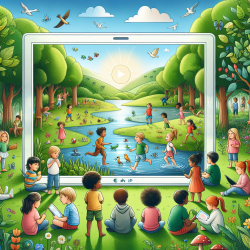Introduction
The Covid-19 pandemic has reshaped our lives in countless ways, particularly highlighting the significance of mental health. A recent study, "Nature experience from yards provide an important space for mental health during Covid-19," underscores the crucial role that nature plays in enhancing mental well-being. As a speech-language pathologist dedicated to fostering positive outcomes for children, it is essential to integrate these findings into our therapeutic practices. This blog explores how practitioners can leverage nature experiences to improve mental health outcomes for children.
The Research: A Closer Look
The study conducted in Brisbane and Sydney, Australia, examined the relationship between yard use and mental health during the pandemic. The findings revealed that frequent yard use was associated with lower stress, depression, and anxiety levels, as well as higher well-being. However, prolonged yard visits were linked to increased stress and anxiety, suggesting that individuals might use nature spaces for emotional regulation during challenging times. This insight highlights the nuanced relationship between nature interaction and mental health, which is context and timeframe dependent.
Implications for Practitioners
As practitioners, it is vital to consider these findings when designing interventions for children. Here are some actionable steps:
- Incorporate Nature-Based Activities: Encourage children to engage in outdoor activities, such as gardening or nature walks, as part of their therapy. These activities can provide a calming effect and improve overall well-being.
- Balance Frequency and Duration: While frequent short visits to nature spaces are beneficial, be mindful of the duration. Encourage children to take regular breaks to prevent overwhelming feelings.
- Create Virtual Nature Experiences: For children with limited access to outdoor spaces, virtual nature experiences can be a valuable alternative. Use videos and interactive sessions to simulate the calming effects of nature.
Encouraging Further Research
The study's findings open up avenues for further research into the role of nature in mental health. Practitioners are encouraged to explore the following areas:
- Longitudinal Studies: Conduct long-term studies to understand the sustained impact of nature experiences on children's mental health.
- Comparative Analysis: Compare the effects of different types of green spaces (e.g., parks vs. private yards) on mental health outcomes.
- Customized Interventions: Develop tailored interventions that consider individual differences in children's responses to nature experiences.
Conclusion
Integrating nature experiences into therapeutic practices can significantly enhance mental health outcomes for children. By understanding the nuanced relationship between nature interaction and mental well-being, practitioners can design more effective interventions. As we continue to navigate the challenges posed by the pandemic, let us harness the healing power of nature to support the mental health of the children we serve.
To read the original research paper, please follow this link: Nature experience from yards provide an important space for mental health during Covid-19.










